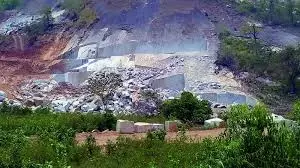Granite, slab polishing industry loses sheen
The granite and black slab polishing industry in Anantapur and Kurnool districts that engages more than 25,000 skilled labourers is facing a major slump.

Rise of granites, marbles, and tiles in the market has diminished interest in polished slabs and colored stones. (Image: DC)
Anantapur: The granite and black slab polishing industry in Anantapur and Kurnool districts that engages more than 25,000 skilled labourers is facing a major slump.
The industry is the largest job provider in Tadipathri and Bethamcherla areas. Over 60 per cent of polishing units in the region have shut down.
The industry, based around Tadipatri town with approximately 650 granite polishing units and more than 1,900 black slab polishing units, has been under immense pressure due to a rise in royalty fees by the state government. At the same time, demand has dropped because polishing units in Telangana are offering better prices reportedly due to industry-friendly policies of TS. In addition, power bills in AP are significantly higher than in Telangana.
Bethamcherla’s polished and colored stones dominant in the market till two decades ago are now stacked in congested rows with sellers anxiously waiting for buyers. The growing popularity of granites, marbles, and tiles has led to a decline in the demand for polished and colored stones. The area, known for exporting polished slabs to other parts of the country has come to a near standstill.
Industrial units are struggling to pay their power bills. While some permanent workers are still employed, many daily wage labourers have been laid off, and managements are facing difficulty even to pay half of their employees' salaries, leading to mounting debts.
Previously around 90 per cent of slab polishing units were located in Bethamcherla, Tadapathri, Banaganapalle, Kolimigundla, and Owk mandals in Kurnool and Anantapur districts.
Notably, there were 500 units in Bethamcherla, 300 in Banaganapalle, 200 in Kolimigundla, 300 in Owk, and 1,600 in Tadapathri, all operating round the clock to meet customer demand.
The industry provided steady income for many migrant families from across the state. However, the rise of granites, marbles, and tiles in the market has diminished interest in polished slabs and colored stones. Additionally, the introduction of the Goods and Services Tax (GST) by the central government has further hindered the industry’s growth. As a result, 30 to 40 per cent of slab polishing units have closed, including 85 factories in Bethamcherla, 35 in Banaganapalle, 60 in Kolimigundla, 60 in Owk, and 260 in Tadapathri.
With many units closed, workers and their families are being forced to take up farm labor to survive. G. Ujwal, a unit organiser from Tadapathri, told the media that rising costs are making it difficult to run polishing units. Previously, transporting stones for one square foot from the quarry cost Rs 8, but now the cost has risen to Rs 14. Power bills have also increased, making it unfeasible for the units to continue operating.
A. Naga Prathap Reddy recalled that their business used to receive numerous contracts from Tamil Nadu, Karnataka, and Maharashtra. Trucks would frequently transport polished slabs, and workers were busy day and night. However, with the emergence of alternative materials like granites, marbles, and tiles, that business has largely disappeared.
Dr M. Suresh Babu, president of the Rayalaseema Development Forum, sought government support to local industries by purchasing polished slabs and colored stones for construction projects like the new capital city of Amaravati. He criticised the government for offering subsidies to corporates while neglecting small-scale enterprises. Despite assurances from Chief Minister N. Chandrababu Naidu that polished slabs would be used in Amaravati's construction nothing has come off it.
( Source : Deccan Chronicle )
Next Story

